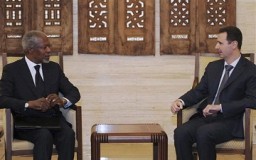In a recent development, Kofi Annan’s peace plan has been accepted by Syria’s government. Although, undeniably it is a welcome decision, there still has to be proper implementation for it to work, otherwise, like all good strategies it may backfire.

1) Dealing with issues of political discussions.
2) Withdrawal of heavy weapons and troops from population centers.
3) Humanitarian assistance being allowed in unimpeded.
4) Release of prisoners.
5) Freedom of movement and
6) Access to journalists to go in and out.
He said. “So we will need to see how we move ahead and implement this agreement that they have accepted.”
He also suggested a daily two-hour humanitarian ceasefire and access to all areas affected by the fighting.
Ahmed Fawzi , spokesperson for the United Nations told the AFP, “The Syrian government has written to the Joint Special Envoy Kofi Annan accepting his six-point plan, endorsed by the United Nations Security Council”. He also stated that, “Mr. Annan views this as an important initial step that could bring an end to the violence and the bloodshed, provide aid to the suffering, and create an environment conducive to a political dialogue that would fulfill the legitimate aspirations of the Syrian people”
The public protest against the government, which saw its uprising on 26 January 2011 and has been ongoing ever since the military rule had taken over free-republican Syria, has taken the lives of about 10,000 and counting, as on 30 March 2012. The protests are for a free and fair country with a good socio-economical condition. Youth unemployment and economic disenfranchisement is a common deed. The rights of speech and expression are strictly controlled to the point of being almost non-existent. Many other injustices against humanity, especially women, are much prevalent, as compared to other countries of the region.
Although the country is under turmoil President Assad appears to be unabashed even as he and his wife, Asma, share jokes over mails about the degraded conditions of women in the Muslim society, wherein Muslim leaders are also targeted.
Although many of Syria’s citizens are heaving sighs of relief over the acceptance of Kofi Annan’s peace plans, it has been greeted with great skepticism by US ambassador Robert Ford as he stated quite bluntly, “We will see … exactly what Assad has said. I have to tell you that my own experience with him is you want to see steps on the ground and not just take his word at face value.”
Ford is not the only one to raise an eyebrow over Assad’s acceptance of the peace proposal. Seeing it as a political ruse, UK’s William Hague, Britain’s foreign secretary, said: “The Assad regime’s acceptance of … Kofi Annan’s six-point plan would represent a significant first step towards bringing an end to the violence and the bloodshed, but only if it is genuinely and seriously meant. This has not been the case with previous commitments the regime has made.”
Also addressing the issue directly is the Syrian National Council, the largest opposition in the country, which stated that “A peaceful transition means that the regime needs to be changed. And that starts with the removal of the head of the state,”
Mr. Annan’s efforts in saving the country from more bloodshed is commendable and his strategy is undoubtedly the need of the hour for the country; but all that that remains to be seen is whether the unexpected acceptance of the peace plan is a political ruse as suggested by critics or a real move to end the civil unrest in the country.
Image courtesy:Â http://irdiplomacy.ir/en/news/20/bodyView/1899103/Annan.and.Assad:.Negotiations.West.wishes.to.fail.html